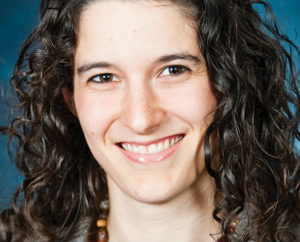Commentary on the Book of Lamentations
We begin with this image: A woman is in agony, face blotchy with tears. She is many things – a refugee, a survivor. She has an ethnic identity, a language. A history. Above all else, she is a mother. Her children have been ripped from her, and she does not know where they have been sent, so she wails in anguish.
How can the image of the anguished mother affect us? First, how it already has: As we imagine the trauma of the torn bond between parent and child and rally in response, our collective action born of outrage has stopped the policy of family separation at the border.
But there is only so much that outrage can do without a greater vision. In the case of U.S. immigration policy, the accomplishments of our empathetic outrage are small against the reality that 2,000 children still have not been reunited with their parents, nor do we have anything close to a humane asylum policy – and “zero tolerance” is more inhumane than ever before.
The image of the mother in agony shows up twice in the narratives related to Tisha B’Av. Every year we are supposed to feel the pain, the outrage, of the weeping mother, when we read in Eicha (Lamentations) on Tisha B’Av: “Bitterly does she weep at night; her tears on her cheeks, without anyone to comfort her. . . Her children have gone to captivity before the foe.” (Lamentations 1:2,5) In Eicha, the woman is the city Jerusalem, weeping for her scattered children. She is impotent to help them.
But there is another mother weeping over the Israelite exile, and according to midrash, she has a moral power that moves beyond outrage to effect change. “A cry is heard in Ramah— Wailing, bitter weeping— Rachel weeping for her children. She refuses to be comforted for her children, who are gone.” (Jeremiah 31:15)
Sign up to receive Torah from T’ruah in your inbox each week!
In Eicha Rabbah 24, the midrash imagines all of the forefathers on the day of the destruction of the Temple, pleading with Hashem (God) for mercy for the Jewish people for the sake of their merits. Hashem rebuffs them all, adamant that the Israelites deserve this punishment for their faithlessness, until Rachel steps forward. She reminds Hashem that she was able to graciously share her husband with her sister Leah, even helping Leah deceive him on her wedding night. She pleads:
If I, who am but flesh and blood, could overcome my jealousy so as not to cause my sister pain, how can You, living and eternal God, be jealous of idols that have no substance? For this you’ve exiled my children, killed them by the sword, and let their enemies have their will with them?!
And it is Rachel’s tears that cause God to relent and promise an ultimate redemption.
Rachel is in pain for two reasons – she is not only in outraged grief over her children’s exile, but she feels the dissonance of knowing what true compassion and graciousness look like – and she is facing a God who needs to be reminded. And is audacious enough to correct God.
It is Rachel’s double moral force that evokes the Divine response. Not this. This is wrong. And: This is how it should be.
 Tisha B’Av reminds us: You know what this awful pain feels like. First, every year, we are supposed to practice feeling the excruciating dissonance between the way things are and the way they should be. We have to feel the deep outrage and pain of the crying mother.
Tisha B’Av reminds us: You know what this awful pain feels like. First, every year, we are supposed to practice feeling the excruciating dissonance between the way things are and the way they should be. We have to feel the deep outrage and pain of the crying mother.
But we must also be Rachel, weeping not only for her children, but naming the more compassionate way of being that we know, that we remember is possible.
In a time that demands so much protest, it can feel exhausting to try to have a positive moral vision. We are called to spend so much time in protest that we can forget the vision of what “normal” looks like. But as Naomi Klein writes in No is Not Enough, our current situation “would have been impossible without the degradation of the whole idea of the public sphere, which has been unfolding over decades.” She points out that in addition to protest, we must work to build positive institutions that align with what community and government should be.
It hurts to hold the vision of the world as it should be. It is easier to act on a moment of outrage at the latest news than it is to feel the deeper, longer pain of dissonance – especially when we fear that we are powerless to live a more positive vision. But Tisha B’Av helps us practice feeling that pain. And Rachel, who could stand before God and offer an audacious vision of humanity, must inspire us to live our own visions, even in the face of inhumanity.
Rabbis and cantors in more than 10 cities throughout the United States will be holding special Tisha B’Av services, vigils and protests, many of them outside Immigration and Customs Enforcement (ICE) offices, on July 21 and July 22, in solidarity with the national catastrophe currently facing immigrant communities and asylum seekers in the United States. Learn more here.
Rabbi Ruhi Sophia Motzkin Rubenstein is a graduate of the Reconstructionist Rabbinical College. She serves as rabbi of Temple Beth Israel in Eugene, OR.

